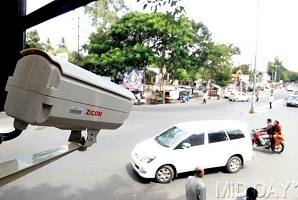The Mumbai Police extended the deadline for all private and commercial establishments in the city to install CCTV cameras by two months. Shopkeepers or commercial establishment owners who refuse to abide by it despite having their shops in crime-prone areas may face legal action. Earlier the deadline for installing CCTVs was January 7.
According to police, incidents of crime occur in public places as well as in the vicinity of private establishments, thus posing a threat to the safety of citizens, and thereby, disturbing peace and tranquillity. CCTVs help police to effectively check crimes and also help in building confidence and a sense of security among citizens. It also deters perpetrators from committing crime as their acts will be recorded. Therefore, the city police in November 2020 under section 144 of the Criminal Procedure Code (CrPC) directed all private establishments in the city to install CCTVs. The establishments include jewellery shops, hotels, guest houses, restaurants, bars and pubs, wine and beer shops, residential towers, banks, ATMs, financial institutions, office buildings, new and upcoming residential towers/office buildings, petrol pumps, shopping complexes, shopping malls, super markets, gyms, sports grounds, stadiums, educational institutions, multiplexes, places of worships, hospitals, trusts and other organizations.
Mumbai Police spokesperson and deputy commissioner of police (operation) Chaitanya Siriprolu, who issued the order, said the deadline for private establishments to install CCTVs has been extended by two months. “The response from private establishments is good. Since we don’t want to forcefully impose it and are expecting active participation from the public, we have extended the deadline by two months. The project is going to ultimately benefit the public and enhance their safety. Citizens understand this and are gradually installing CCTV. Policemen at the police station level are conveying to establishment owners the importance of the step and encouraging them to install CCTV,” he said.
“With citizens’ active participation in installing CCTV cameras, we aim to have a dense network of nearly 300,000 virtual eyes which would cover every nook and corner of the city. The crime rate will go down drastically,” a senior IPS officer said. It is also observed that in cases where private establishments have CCTV systems installed, the direction and field of view of the cameras are such that the area outside such establishments is not covered, the camera quality is inadequate, the recording capacity is inadequate or non-existent, resulting in incidents of crime not being captured and recorded. Hence the establishment owners are directed by the police that CCTV cameras must cover an area of around 50 metres from the establishment. CCTV should be of good quality and should be working at all times. It should have the recording capacity of at least 15 days with features to playback the recording and also to take a copy of the same.
In Mumbai, there is already a network of around 5,000 government- operated CCTV cameras covering arterial roads, main roads, junctions. These 5,000 cameras are installed at over 1,510 sensitive locations across the city. The existing CCTV network is also used by the traffic police to maintain vehicular traffic in the city. The government would soon be adding additional 7,000 cameras to its network.








